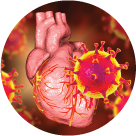2D Echo Test Effective In
Detecting Heart Blockages

Honest Pricing

Highly Experienced Radiologists

Advanced Imaging Diagnostics

Trusted, Transparent & Affordable

What is an Echocardiogram?
An echocardiogram (ECHO) is a type of ultrasound scan that is conducted to evaluate the heart and the nearby blood vessels.
This test aims to monitor and assess the functioning of the heart and valves. It also enables a cardiologist to evaluate the blood flow in the blood vessels and to monitor the heart’s pumping chambers.
An echo works on the same principles as that of ultrasound, using high-frequency sound waves that bounce off of different parts of the heart. This, in turn, produces high-quality images which are displayed on a screen.
This heart test is a non-invasive and painless diagnostic procedure. For additional clarity and depending on the cardiac condition the test is being conducted, the echo can also be paired by Doppler ultrasound and colour Doppler scans.
An ECG or an electrocardiogram test is a non-invasive and painless diagnostic procedure that helps in the detection of heart issues as well as monitoring the overall heart health.
An ECG monitors the electrical activity of the heart as each heartbeat generates an electronic pulse that travels through the heart.
The electrical pulse contracts the arterial muscles which in turn pump the blood from the heart. The test detects and identifies any abnormal electrical activity, indicative of a heart illness or the risk of one.
There are two main types of frequently recommended echocardiograms. These are:
- Transthoracic echocardiogram: The frequently ordered echo test, the Transthoracic echocardiogram is conducted to evaluate your overall heart health as well as to measure the contraction of the heart’s muscles.
- Stress echocardiogram: This echo test type is conducted to ascertain your’s heart’s functioning while stressed. The test typically includes physical exertion induced stress with the help of a workout cycle, a treadmill or by administering Dobutamine, to make your heart beat faster.
Why is an Echocardiogram required?

To assess damage from a heart attack

Infection of the heart’s valves (endocarditis)

Congenital heart disease

Cardiomyopathy

Heart failure
Frequently asked questions
An abnormal echocardiogram test result denotes the onset of the presence of an underlying heart condition.
This test helps your doctor in diagnosing the issues and creating an effective treatment plan.
Not necessarily. Typically a 2D echo test does not require fasting. However, it’s best to consult with your doctor and avoid large meals before the test.
Yes, episodes of anxiety can interfere with ECG tests, especially with normal heart readings.
Absolutely. An echocardiogram or echo is the most potent diagnostics tool to detect and identify the symptoms of heart failure.
An echo test can detect issues in the heart’s arteries, but it cannot identify arterial blockages
Take the following precautions before an electrocardiogram to avoid interference with the test.
- Do not eat or drink anything at least 4 hours before the test
- Do not take caffeinated beverages a least 24 hours before the test
- Do not smoke on the day of the test
